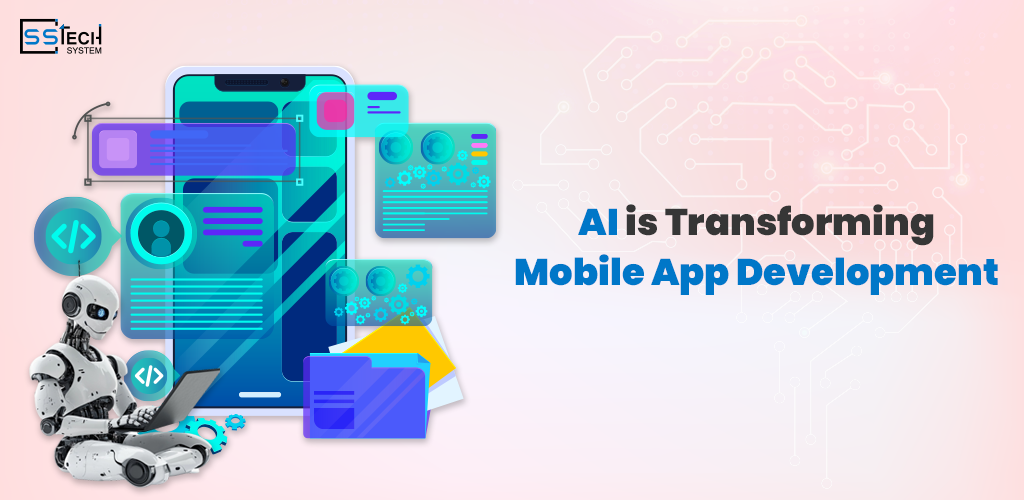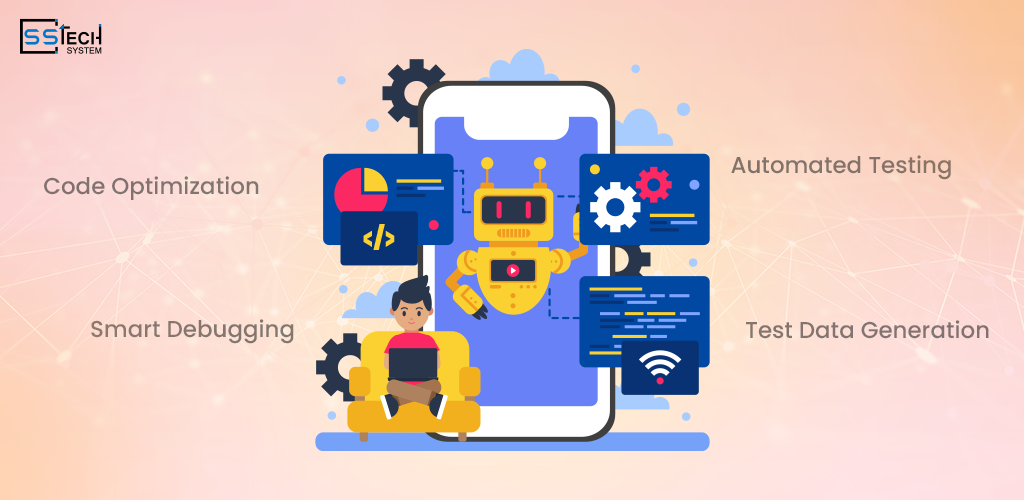
Artificial intelligence is no longer an abstract concept in today’s society; it is a revolution in technology. From recommending the right content to recognizing the user’s voice and even predicting their behavior, AI is transforming mobile apps. Mobile app development has grown by incorporating mobile artificial intelligence into it, with the ability to improve the engagement, automation and even decision making.
As we are in the age of innovation, companies are embracing AI app development to provide a smart, intelligent and personalized experience. Consequently, AI-powered mobile apps are revolutionizing almost every sector of the world. Regardless of whether you are an entrepreneur, a developer or a business that wants to grow, it is vital to know how AI in app development functions to remain relevant.
What’s AI Doing in Mobile App Development?
If you have ever asked yourself how your music app knows the next song you will like or how your ride-hailing application finds the shortest route, then you should thank Artificial Intelligence. Artificial Intelligence in mobile apps is one of the most subtle yet powerful trends in the modern digital environment.
Core AI Functions in Mobile Apps:
- Natural Language Processing (NLP): It allows applications such as Siri or Google Assistant to translate human language.
- Machine Learning in Mobile Apps: Enables applications to adapt and gain knowledge from the patterns in the data and become better in the process.
- Image and Voice Recognition: Used in social networks, photo editors, and AI chatbots for mobile applications.
- Predictive Analytics: Applied in finance, health, and eCommerce applications to predict the result or recommend an action.
The Game-Changing Benefits of AI in Mobile App Development
-
Hyper-Personalized Experiences
AI helps to improve mobile app development through the hyper-personalization of the user experience. AI-powered mobile apps use behavior tracking and big data to deliver personalized recommendations—boosting engagement, retention, and conversions, and giving your app an edge in saturated markets like e‑commerce, fitness, and media.
-
Smarter Interfaces and Automation
The use of mobile artificial intelligence makes interfaces easier to use and more interactive. AI provides automation capabilities for features such as reminders, scheduling and onboarding of the users. It not only enhances efficiency but also user experience, making it one of the key selling points in the latest AI app development and mobile software development.
-
Enhanced User Engagement
AI-driven mobile applications are engaging for users due to real-time recommendations, smart notifications, and adaptive interfaces. This intelligent engagement assists in retaining the users as it keeps them constantly engaged with the app’s primary function. AI in app development is revolutionizing how user interfaces are developed through the use of features such as chatbots and adaptive content.
-
Data-Driven Decision Making
The use of Artificial Intelligence in mobile apps helps businesses in gaining valuable information from the users. These insights can be used to improve features, the GUI, and the marketing of the product. AI development for mobile apps helps developers and business managers to make the right decisions, to avoid the trial-and-error approach and to gain more profit from AI-based app development projects.
-
Stronger Security
Mobile app security is enhanced by AI as it is able to identify threats and potential breaches, as well as assess vulnerabilities. It is important to note that AI and mobile app security must be implemented for financial, healthcare, and enterprise apps. Machine learning models keep learning new things about the threats that are emerging in the market, which makes AI an additional layer of security in the AI mobile app development by SSTech System.
Real Use Cases: How Top Apps Are Using AI
-
Spotify and Netflix
Both platforms use AI-powered mobile apps to personalize content recommendations. They use machine learning in mobile apps to understand the users’ behavior, history of watched or listened content, and preferences to recommend playlists or shows, which increases the app’s usage.
-
Google Maps and Uber
These apps utilize AI in app development to provide real-time route optimization, traffic prediction, and accurate ETAs. They learn and respond to the changes in traffic patterns and users’ behavior which makes it easier for a user to navigate through.
-
Amazon and eBay
Through AI-driven mobile applications, these e-commerce giants offer dynamic pricing, smart product recommendations, and personalized user journeys. Their mobile software development strategy involves using artificial intelligence to look into the browsing patterns and transaction history to increase conversion rates and customer satisfaction.
-
Duolingo
Duolingo employs AI-based app development to personalize language learning. The app has the feature of changing the difficulty of the lessons depending on how the user performs, employing AI development for mobile apps to track progress and engagement.
Behind the Scenes: AI in Testing, Debugging, and QA

Even though AI is generally linked to front-end elements such as chatbots and personalization, it is equally useful in improving backend aspects of mobile app development. From bug detection to automating the process of testing, AI enhances quality assurance and shortens the development time.
-
Automated Testing
AI testing tools can run thousands of test cases across devices and conditions, speeding up development and improving app quality by detecting issues human testers might miss. Over time, AI learns from results to enhance its performance and accuracy.
-
Smart Debugging
Before the code is deployed, AI helps the developers to identify bugs within the code using pattern recognition and anomaly detection. This helps to minimize the time taken in debugging during mobile software development. AI debugging tools are particularly useful in large-scale AI app development projects because complexity can hide errors.
-
Code Optimization
AI can suggest the improvement of code quality, eliminate unnecessary code, and optimize the structure of the code, which makes the codebase cleaner. For businesses who are adopting AI development for mobile apps, it leads to more efficient and sustainable apps. Smart suggestions also increase the speed of work, which is especially valuable in an agile setting that involves many repetitions.
-
Test Data Generation
AI can generate realistic, diverse test data that is close to the actual users. This makes it possible to have a realistic model of how your AI-based app development process will look like, enhancing the quality of the apps that you create. It is especially beneficial for the AI-driven mobile applications that focus on interactions with the users, individualization, and data handling.
SSTech app development teams leverage AI to enhance the efficiency of the QA process while also reducing the time required to deliver the products, while ensuring the highest quality.
The Future of AI in Mobile App Development
-
AI-Powered Voice & Gesture Recognition
As mobile artificial intelligence is improving, the applications are no longer limited to speech recognition but also to gesture. This makes it possible to have touchless interaction, something that is very beneficial especially in smart homes, fitness tracking and gaming.
-
Real-Time Translation and Localization
The globalization of business has made it essential to have real-time translation of languages. AI development for mobile apps can identify the language of the user and adapt the content to that language. This not only increases user interaction but also increases the distribution of the application. AI-driven mobile applications are suitable for global users in mobile software development.
-
Emotion Detection for Deeper User Interaction
Thanks to machine learning in mobile apps, developers can include emotion recognition based on facial expressions, voice tone, or text input. This feature makes AI-powered mobile apps more compassionate, which is suitable for mental health, customer support, and gaming applications. It enriches the concept of AI mobile app development by SSTech System with a human aspect.
-
Advanced AI Analytics Dashboards
Future AI-based app development will include smarter analytics tools built right into the app interface. These dashboards will incorporate artificial intelligence in mobile apps to provide prediction, behavioral analysis and performance prediction. The use of these tools will help businesses to make better and quicker decisions in the Android app development and iOS platforms.
Conclusion
Integrating AI in mobile application development is no longer optional—it’s essential. From smarter user experiences to robust backend operations, AI is shaping a new era of app intelligence. Businesses that adopt AI mobile app development are not just building apps; they’re building smarter digital ecosystems.
Whether you’re developing for Android, iOS, or cross-platform, leveraging AI-driven app solutions in Australia and beyond allows you to deliver personalized, scalable, and secure mobile applications. To stay competitive in this AI-first world, it’s time to think beyond traditional development—build smarter, not just bigger.
FAQs
-
How is AI used in mobile app development?
AI is used in mobile app development to automate tasks, personalize content, enhance user experience, provide real-time insights, and improve app performance.
-
What are the benefits of AI-powered mobile apps?
AI-powered mobile apps offer benefits like improved user engagement, smart automation, personalized experiences, better customer support, and enhanced app security.
-
How do AI chatbots improve mobile applications?
AI chatbots for mobile apps offer real-time assistance, answer customer queries instantly, and reduce operational costs. They enhance user satisfaction, improve retention, and offer 24/7 support without human involvement.



